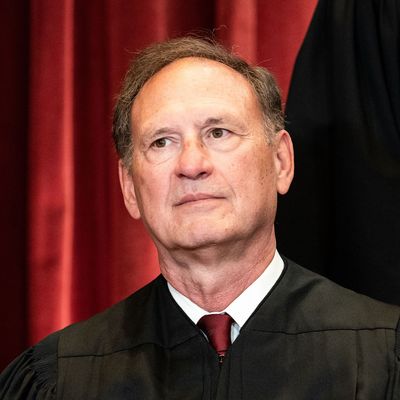
There was considerable dismay among voting-rights advocates when the U.S. Supreme Court, on the final day of its 2021-2022 term, upheld two Arizona voting restrictions by a 6-3 vote in Brnovich v. DNC. It mostly stemmed from the cavalier attitude Justice Samuel Alito displayed toward victims of voter suppression in his majority opinion, and the fact that the Court’s other conservatives lined up behind him in a way that departed from the unpredictable lineups of so many other recent decisions. I described Brnovich and another 6-3 decision (Americans for Prosperity v. Bonta, invalidating a California disclosure law that annoyed wealthy right-wing donors) as a moment when the “conservative majority bared its teeth,” with possibly dire implications for the future.
The more voting-rights advocates examine Alito’s reasoning in Brnovich, though, the more they fear the decision itself could have serious and immediate negative consequences. At Slate, voting-law expert Rick Hasen wrote that each time he re-reads Alito’s opinion, “the angrier I become.” In his informed opinion, Alito and his colleagues — ostensibly “textualists” devoted to the plain meaning of legislative language — subverted and even reversed the 1982 amendments to the Voting Rights Act of 1965 that were clearly intended to rein in the sort of thinly veiled discriminatory actions taken by Arizona in the laws in question. What’s worse is that the amendments were made necessary by an earlier SCOTUS decision that restricted lawsuits under Section 2 of the VRA to those in which discriminatory intent could be proven. In turn, Section 2 has become vastly more important since the Court’s 2013 decision neutering Sections 4 and 5, which provided for pre-clearance of voting- and election-law changes in jurisdictions with a pattern of discrimination.
What Hasen is describing is a sort of chess game between SCOTUS and voting-rights advocates that the latter keep losing. Worse yet, Court conservatives are going far out of their way to uphold state legislative prerogatives in voting rights even as they disregard them in regulatory cases like AFP v. Banto. “There’s no getting around the reality that the new Supreme Court has its conservative favorites and its progressive enemies, and that the court stands ready to re-craft American democracy in its image,” writes Hasen.
The new judicial threat to voting rights is imminent because the Biden administration’s Justice Department intends to use Section 2 to challenge the current wave of state voting restrictions and election laws. Winning cases just got a lot tougher.
But Ron Brownstein at The Atlantic spoke to some other election-law experts and wrote about even more pervasive threats presented by Brnovich. They fear the Court may find ways not only to thwart use of Section 2, but to invalidate legislative fixes of the VRA (as incorporated in the John Lewis Voting Rights Act, intended to repair Sections 4 and 5, which 51 senators, including Joe Manchin and Lisa Murkowski, support). To the extent that Alito demands deference to the priorities and value judgments of state legislatures in voting-rights matters, you could see the Court striking down the broad-based For the People Act (S. 1) if Democrats ever figure out a way to get it through the Senate:
[M]any voting-rights advocates see in it continued signs that the conservative Court majority will resist new federal voting mandates on the states. Although the entire focus from voting-rights advocates in recent months has been “filibuster, filibuster, [finding] political will, what we’re seeing now is [that] passage of an act is far from the final word,” Levinson said. “Justice Alito signaled that [he will] be really suspicious” if Congress infringes “on state prerogatives.”
In other words, it’s not just a matter of a Court finding ways to interpret existing laws to give states deference; the conservative majority may find constitutional grounds for rejecting new and very clear legislation as well. And there is an even greater concern in some circles: that the Court will adopt a sketchy conservative argument that the constitutional provisions giving state legislatures unique power over presidential elections could invalidate any federal regulation of federal elections other than midterms. That would be disastrous, says Brownstein:
In practice, having different voting and registration rules for presidential and congressional races could be chaotic and nearly impossible to administer. The fact that serious analysts don’t rule out this Supreme Court majority reaching that conclusion crystalizes the uncertainty about which federal election rules, if any, it considers beyond challenge.
What’s clear is that an urgent effort to make voting rights federally guaranteed since they are under sustained attack in the states has enemies in two branches of the federal government: Mitch McConnell in the U.S. Senate, and six Justices on the U.S. Supreme Court. If Democrats lose the White House in 2024, it could become unanimous.






























